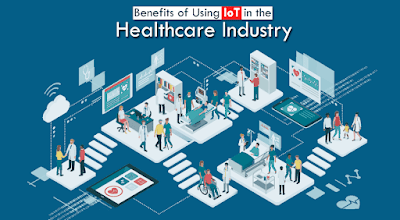Healthcare is one of the most important industries, but due to the complexity, level of responsibility and strict regulations, innovations have to come a long way before they get fully adopted in this domain. Internet of Things could be the technology that will help us solve these and other problems in healthcare. The Internet of Things (IoT) has already transformed our world. It affects the way we work and live our life. In today's world when Broadband Internet is easily available everywhere at an affordable price, different sensors have been developed, a wide range of gadgets and devices entering our world, affordable smartphones are stabbing. All of these reflect how IoT is involved in our day to day lifestyle and in countless sectors of the economy, also in the health sector.
With the momentum through which technology is supporting the medical sector, it becomes compelling to take into account that we humans are keeping a close watch on the medical circumstances through. In all these, it is the internet of things that has managed to stitch together the technical aspects of healthcare. Well, the Internet of Things is a humongous network that has been designed through extended internet connectivity into physical devices and everyday objects. These devices and objects interact with each other over the internet and can also be controlled and monitored effortlessly.
Let us explore how the Internet of Things has revolutionized the healthcare sector:
1. Brings Continuous Health Monitoring
These
days, fitness bands, heart rate monitoring cuffs, blood pressure
measuring bands, glucometer, and more advanced smart healthcare devices
provide patients with real-time personalized health status. They remind
the patient to keep a check on their regular calorie consumption,
improve exercise routine, identifies changing blood pressure trend, and
more. For elderly patients, it gets crucial to track their health
conditions on a daily basis, and smart healthcare devices make their
lifestyle easier by letting them know about any possible danger
beforehand! It alerts the patient as well as to the patient’s family
members in order to warn them about the unexpected fluctuations in the
patient’s health conditions.
2. Makes Hospitals Smarter
The
IoT in healthcare is capable of monitoring the regular and minute
details of the patient’s health. Apart from this, there are several
other aspects where IoT makes healthcare industry perform better. One of
the aspects is Asset Management. Be it the wheelchairs, oxygen pumps,
nebulizers, defibrillators, or some other monitoring equipment; they are
tracked down on a regular note to be aware of their real-time
locations.
Hospitals are vulnerable, and the spread of infections is
a huge concern. With IoT enabled hygiene monitoring devices, smart
hygiene monitoring has become a thing of the past. IoT adoption ensures
better patient protection, hospital asset management (pharmacy inventory
control) and environmental monitoring, humidity, and temperature
control for the healthcare industry.
3. Helps You Keep Track of Your Patients
These
days, physicians or personal nurses can keep track of their patient’s
health through wearables and some other home monitoring equipment. These
equipment are embedded with IoT sensors that support the physicians to
track the patient’s medical diagnostic status effectively. Planning the
patient’s treatment schedule, staying alert about those patients who
require immediate medical treatment could all be done in effortless
ways. A hospital holds several patients having the requirement of
different medical assistance.
4. Makes Insurance Claims Transparent
Keeping
this scenario in mind, IoT devices have managed to design transparency
between the insurers and the customers in the underwriting, risk
assessment processes, claim handling, pricing, and some more. It is
amazing to see the applications of IoT in healthcare have enabled
data-driven decisions throughout every operation process. The customers
will have fair visibility into the fundamental processes that are
compulsory for the successful completion of the insurance processes. The
IoT devices also enable the insurance companies to validate the claims
through the data collected by some devices.




0 Comments